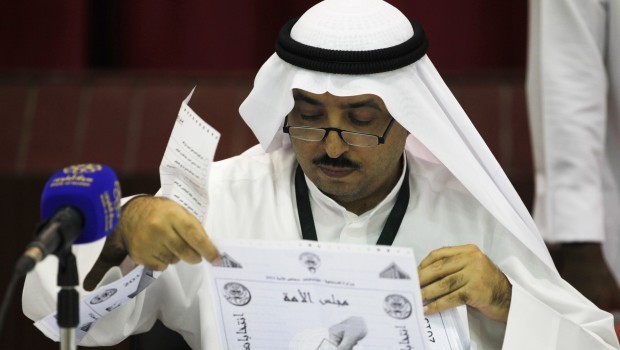
A judge counts votes during the early hours of the night after elections closed at the Khaldiya polling station in District 3, Kuwait City, on July 27, 2013. (REUTERS/Hamad I Mohammed)
Tribal groups held on to their 24 seats in the 50-member National Assembly, although the tribes represented shifted towards those who support the ruling Al-Sabah family in the face of a boycott from liberals and Islamists.
Shi’ites, who are 30 percent of the Kuwaiti population, saw their representation decrease from 17 seats to 8.
The election was held in extreme summer heat during the fasting month of Ramadan, leading some commentators to speculate that unpleasant conditions would decrease voter turnout. However, official figures estimate that 52.5 percent of eligible voters turned out to the polls, a 12% increase from the last elections in December 2012 but still lower than the historic average of 60 percent.
In a move aimed at bolstering turnout, some Kuwaiti religious leaders issued rulings saying that it could be acceptable to break the fast given the high temperatures.
Kuwait has the oldest and most open parliament in the Gulf, but there has been a growing trend to dissolve governments on procedural grounds. The last government, elected in December 2012, was dissolved for this reason by the Supreme Court in June this year, and no government since 2006 has served its full term.
The political instability has stalled a number of lucrative oil projects outlined in a 2010 economic plan. A key theme of this electoral cycle has been bringing economic stability to the small, affluent Gulf nation.
The economy was a key theme in this round of campaigning, with candidates also expressing concern over a proposed USD 4 billion aid package for Egypt and addressing the need for further development in a country with one of the highest per-capita incomes in the world.
In another ruling released since the last election, the Supreme Court upheld a change in the voting law that reduced the number of votes per person from four to one.
Opposition figures had challenged the vote reduction, arguing that it would prevent them from obtaining a majority in parliament. The decision to uphold the law led several members of the Islamist and liberal trends to boycott the elections.
Kuwait does not allow political parties, so candidates run either as independents or under an unofficial affiliation to a trend or tribe. The emir, prime minister and senior cabinet officials are all members of the Al-Sabah family, although Kuwaiti MPs have a great deal of leeway to criticize and question the ruling family.
According to KUNA, the state news agency of Kuwait, the emir, crown prince and prime minister have each sent congratulatory messages to the new MPs.
